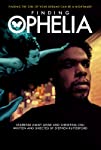Eye For Film >> Movies >> Finding Ophelia (2021) Film Review
Finding Ophelia
Reviewed by: Jennie Kermode

Did you ever have an imaginary friend? As adults we tend to be dismissive about them, but they're important to helping us learn how to interact with others, and most psychologists agree that just because the person one is interacting with is imaginary doesn't mean that the relationship can't be real. A surprising number of people keep such friends as they get older. It becomes a problem, however, if that relationship causes one to neglect important aspects of life. For William (Jimmy Levar), obsession with a woman he sees in his dreams threatens to cost him everything - and to complicate things further, she might actually be real.
William Shakespeare knew exactly what he was doing when he created the iconic image of Ophelia drifting in water. He even calls her a nymph. That same otherworldliness can be seen in John Everett Millais' famous painting - the one which gave his poor model hypothermia. One can only hope that the water is warmer in Stephen Rutterford's version. His nymph (Christina Chu-Ryan) is more active, dancing in the water, entwined with fabric rather than flowers. She seems to be calling to William, reaching out to him, until he becomes convinced that she must have a presence in the physical world. But how can he find her?

There's a finely drawn story at the heart of this film, bringing elements of folklore to the streets of New York City in a way that feels utterly natural and appropriate, It's unpleasant, sometimes gory, in the manner of those older tales, and sometimes Rutterford lays on the symbolism too heavily, but everything here has a purpose. He also makes interesting use of dance to tell the story, most notably in a sequence where William walks home after a night out, seeing people staggering around him and writhing on benches or the sidewalk.
Obscuring all this, unfortunately, is a surfeit of visual effects which suggests that the director, who did his own editing, has just acquired some new software and wants to show us absolutely everything it can do. A little of this could work well, adding to our understanding of William's altered mental state and his increasingly tenuous connection to our world, but there is far, far too much of it and it overwhelms everything else. To make matters worse, though some of it is pretty, practically all of it has been done better somewhere else before, in a context where it actually served a purpose. It's a real shame because if Rutterford had been confident enough to keep things simple, he could have had a real winner on his hands here.
Levar makes an impressive lead, able to keep William believable and sympathetic despite all this, and one hopes that casting directors will take note. The supporting performances are mixed bunch. A scene involving a police officer is ridiculously unlikely, dreadfully written and delivered with the sophistication of a primary school nativity, yet Levar still somehow manages to emerge from it with his dignity intact. He carries the theme of romantic longing well even as he film lurches into frantic jump-cutting territory, and the ending is much more effective than you might expect.
This is a messy film which quickly gets out of its depth, but if you have the patience to stick with it, it does have its moments.
Reviewed on: 20 Jun 2021
















